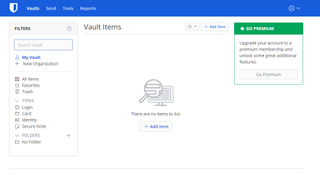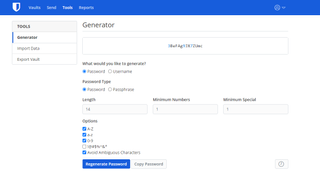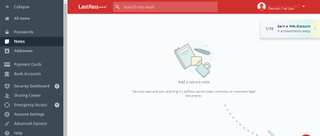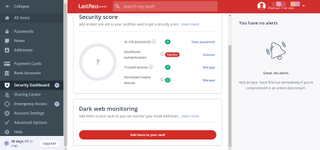Bitwarden vs LastPass: a features comparison
We compare for personal, family, or business use

Password management apps are very useful in helping active internet users keep track of their passwords across multiple websites and applications and avoid being locked out of their accounts.
There are many password managers available, and two popular examples are Bitwarden and LastPass. These examples offer similar functionality, enabling users to store passwords and other types of sensitive information in a digital vault. Yet, we want to see how they compare to each other based on other critical factors like features, pricing, performance, and customer support. You can see our previous Bitwarden review and LastPass review for more information.

Bitwarden vs LastPass: Features
LastPass and Bitwarden work the same way. You can create a digital vault where you’ll keep passwords and other types of sensitive information. Any time you need to remember a password, you can head to the vault to retrieve it.
The vault is protected by a master password you create and must input anytime you want to log into it. You should use a mixture of letters, numbers, and symbols to create a strong master password. Alternatively, you can use a passphrase that’ll be hard to guess, e.g., “Aren’t dogs beautiful creatures?”.
Both platforms offer a browser extension that lets you autofill passwords on login forms across different websites. These extensions are available for popular browsers like Google Chrome, Microsoft Edge, Firefox, and Opera.
Where both platforms differentiate themselves is in the extra features they offer. For instance, Bitwarden offers a tool that allows you to generate strong passwords at the click of a button, passwords to protect your online accounts. LastPass offers a dark web monitoring tool that checks your credentials against a database of hacked credentials and notifies you if you were a victim of a data breach.
You can access both platforms from a web interface or mobile and desktop apps.

Bitwarden vs LastPass: Performance
LastPass offers solid performance through its web interface or native apps. You can download the apps on a smartphone (iOS or Android) or a desktop (Windows, macOS, and Linux). Once installed, you can add credentials for different websites to your vault with ease. You can also access these credentials at any time.
Note that LastPass’s desktop application allows you to add a maximum of 5,000 items, including passwords, notes, forms, or any other type of sensitive information. Yet, you should expect to see noticeable performance degradation after adding around 2,500 or more items.
Bitwarden is also accessible through a web interface or native apps for desktops (Windows, macOS, and Linux) and smartphones (iOS and Android). The apps offer a spacious interface that you should find easy to navigate, with features arranged neatly on the left side of the dashboard.
Just like with LastPass, you may notice a decrease in performance after adding too many items to your Bitwarden vault. The platform doesn’t mention a specific threshold, but user reviews across the web put it at around 2,000 items.

Bitwarden vs LastPass: Support
LastPass offers customer support through email and telephone but free users can't access this support. Otherwise, there's an official help page with a plethora of articles and user guides to help users get familiar with the platform. There’s also an official support forum where you can interact with other LastPass users and seek solutions to problems you encounter.
Bitwarden offers customer support through email. There's no option to talk with its support agents via live chat or phone. Otherwise, you can head to the official Bitwarden Help Center for articles and user guides to help you navigate the platform. Just like LastPass, there’s also an official support forum where you can interact with other Bitwarden users and seek solutions to problems you encounter.
LastPass is the winner in this category, as it offers more support options than Bitwarden. You can talk with LastPass’s support team via telephone and get instant help, whereas, with Bitwarden, you have to send an email and wait some hours for feedback.

Bitwarden vs LastPass: Pricing
Both LastPass and Bitwarden offer a free tier that anyone can use but with limited features.
They offer different paid plans for personal, family, and business use. Bitwarden's personal tier costs $10 / £10 / AUD$15 annually, much less than LastPass's equivalent plan which costs $3 / £3 / AUD$5 per month when paid annually.
Bitwarden’s family plan costs $3.33 / £3 / AUD$5 per month and supports up to six users, while LastPass charges $4 / £4 / AUD$6 per month for the same number of users.
For corporate use, Bitwarden offers two plans; Teams and Enterprise. The former costs $3 / £3 / AUD$5 per month per user, while the latter costs $5 / £5 / AUD$8 per month per user. The difference is that the latter includes advanced functionalities like single sign-on integration.
Similarly, LastPass offers two different tiers for corporate users. Businesses with less than 50 personnel pay $4 / £4 / AUD$6 per user per month for a LastPass subscription. Those with a headcount above 50 pay $6 / £6 / AUD$9 monthly for each user. Alternatively, see what LastPass promo codes are currently available and how you can save here.
| Header Cell - Column 0 | LastPass | Bitwarden |
|---|---|---|
| Free tier | Yes | Yes |
| Personal | $3 per month | Less than $1 per month |
| Family | $4 per month | $3.33 per month |
| Business | $4 to $6 per user per month | $3 to $5 per user per month |
Bitwarden is clearly the more affordable option. But, note that if you represent a large company with hundreds to thousands of employees, you can contact both Bitwarden and LastPass’s sales teams to arrange a custom plan with bulk discounts.
Bitwarden vs LastPass: Verdict
LastPass and Bitwarden each have their pros and cons against the other. The latter is the more affordable option but offers lesser options for customer support. LastPass is more expensive and offers better customer support, making it more suitable for enterprise users.
Both platforms offers pretty good performance, so there’s no cause to worry in that category. All in, we think Bitwarden is the better option for personal and family use, while LastPass is the better option for corporate use.
You might also like LastPass Free vs Premium: a features comparison and Keeper vs LastPass: a features comparison.
Are you a pro? Subscribe to our newsletter
Sign up to the TechRadar Pro newsletter to get all the top news, opinion, features and guidance your business needs to succeed!
Stefan has always been a lover of tech. He graduated with an MSc in geological engineering but soon discovered he had a knack for writing instead. So he decided to combine his newfound and life-long passions to become a technology writer. As a freelance content writer, Stefan can break down complex technological topics, making them easily digestible for the lay audience.
